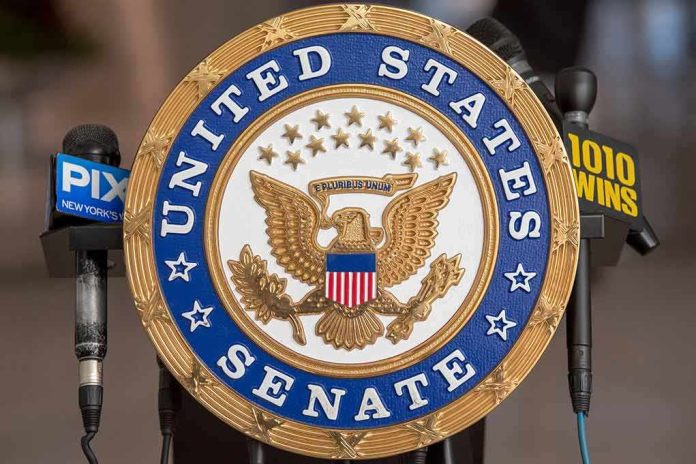
Senator Chris Murphy’s warning that America is “actively transitioning” toward authoritarian rule under Donald Trump isn’t just another political jab—it’s a detailed alarm bell about an unfolding shift, not a hypothetical threat, and the evidence behind it demands attention.
Story Snapshot
- Murphy claims Trump’s tactics constitute a five-part authoritarian strategy, targeting media, justice, federal force, and budgets.
- Senate address and media amplified Murphy’s unusually direct framing: the transition is happening now, not just a risk.
- Polarization and debates intensify as Trump’s supporters reject accusations and critics cite mounting evidence.
- Experts warn about democratic backsliding, while institutional resilience remains a contested safeguard.
Murphy’s Five-Part Warning: A Breakdown of Alleged Authoritarian Tactics
Senator Chris Murphy didn’t mince words in his October 2025 Senate address, accusing Donald Trump of orchestrating a methodical transition toward authoritarian governance. Murphy laid out a five-part plan: deploying federal force against dissent, manipulating the justice system to target critics, undermining media independence, making politically punitive budget decisions, and promoting state-aligned narratives. He described these as steps not of potential risk, but an active strategy that is currently reshaping America’s democracy. Murphy’s framing stands out for its specificity, as he cited concrete examples rather than broad accusations.
Murphy’s critique extends to Trump’s use of federal agencies—such as the Justice Department and military—to suppress opposition. The deployment of federal forces in cities like Portland and Chicago, justified as measures to quell unrest, is presented as evidence of an executive branch willing to override local authority. Murphy also warned of the justice system being weaponized to pursue political adversaries, highlighting a pattern that democracy watchdogs describe as “democratic backsliding.” The senator’s call for bipartisan action was as urgent as it was direct, imploring Congress to defend democratic norms before institutional safeguards erode further.
Historical Parallels and the Stakes for American Democracy
Accusations of authoritarian tendencies have shadowed Trump since his first term, with critics pointing to his confrontational rhetorical style, expansive executive orders, and frequent clashes with the media and judiciary. Murphy’s current warning builds on these concerns but escalates the narrative: he claims America is in the midst of a transition, not simply flirting with authoritarianism. Historical comparisons to leaders who consolidated power through similar tactics evoke serious questions about the resilience of American institutions. Murphy’s five-part breakdown resonates with examples from abroad, where unchecked executive power, control of information, and suppression of dissent have led to democratic decline.
Murphy’s remarks arrive during a period of intense polarization, with Congress deeply divided and public trust in institutions waning. Trump and his allies dismiss the accusations as partisan attacks, arguing that his actions are in line with defending law and order and countering media bias. However, mainstream media outlets and advocacy organizations corroborate Murphy’s claims with documentation of military deployments, regulatory threats to media, and executive maneuvers targeting political opponents. The stakes are high, as continued polarization and institutional conflict risk further undermining the pillars of American democracy.
Expert Perspectives: Democratic Backsliding or Political Overreach?
Political scientists and democracy watchdogs have increasingly warned of “democratic backsliding” in the United States, echoing Murphy’s concerns. Some legal scholars maintain that institutional checks remain robust, while others see signs of erosion—especially in the independence of the judiciary and press. Debate persists over the immediacy and severity of the threat: Trump’s supporters argue that these accusations are exaggerated and politically motivated, while critics believe the pattern of behavior is unmistakable. Murphy’s claims draw support from documented government actions and public records, but interpretation remains divided along partisan lines.
Short-term impacts include heightened political polarization, increased scrutiny of federal agencies, and a fierce media debate over press freedom. Long-term risks are more profound: if the alleged trends continue, democratic norms, civil liberties, and institutional trust may erode. Civil society organizations, journalists, and political opponents are most directly affected, but the broader public also faces the consequences of reduced institutional credibility and growing social divisions. The media sector, legal advocacy groups, and Congressional leadership play pivotal roles in shaping both the narrative and the response.
Sources:
QuiverQuant Press Release & Summary



